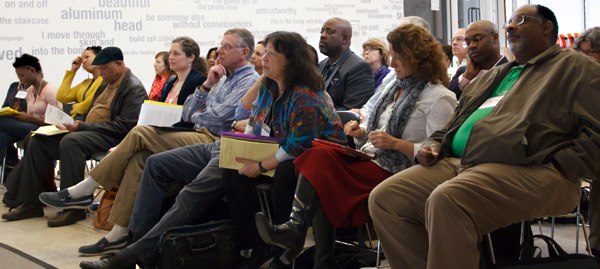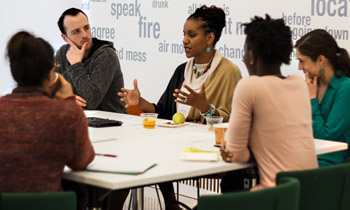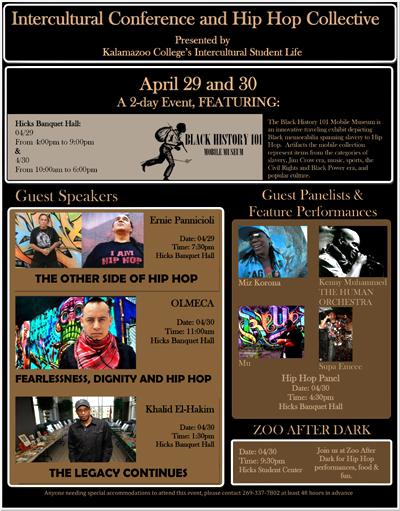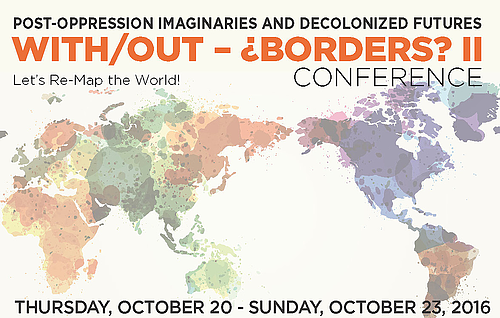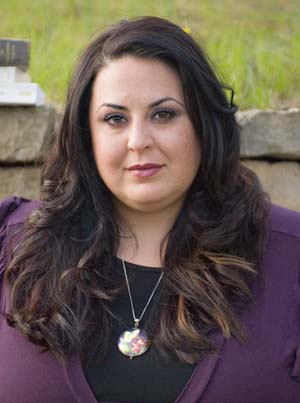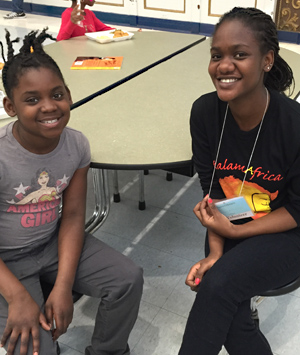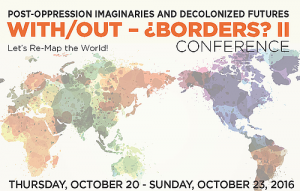 Kalamazoo College officials announced today applications remain open to attend the 2016 With/Out ¿Borders? Conference hosted by the Arcus Center for Social Justice Leadership (ACSJL) on the K campus in Kalamazoo, Mich., Oct. 20-23.
Kalamazoo College officials announced today applications remain open to attend the 2016 With/Out ¿Borders? Conference hosted by the Arcus Center for Social Justice Leadership (ACSJL) on the K campus in Kalamazoo, Mich., Oct. 20-23.
With/Out ¿Borders? features a panel of distinguished participants, including actor and writer Daniel Beaty, American studies scholar and social movements historian Christina Heatherton, journalist and author Naomi Klein, and New Orleans poet and singer Sunni Patterson.
![Naomi Klein [photo credit Kourosh Keshiri]](http://www.kzoo.edu/news/files/2016/04/aomi-Klein-by-kourosh-keshiri-300x250.jpg)
According to Brock, Naomi Klein will deliver a conference keynote presentation and participate in panel discussions. Klein is an award-winning journalist, syndicated columnist and author of The Shock Doctrine: The Rise of Disaster Capitalism. Published worldwide in 2007, Shock has more than a million copies in print in 30 languages. Her critically acclaimed new book, This Changes Everything: Capitalism vs. the Climate, was a 2014 instant bestseller now being translated into more than 20 languages. A documentary film based on the book will be shown during the conference.
Also during the Conference, Sunni Patterson will perform a spoken word/poetry piece, Christina Heatherton will discuss and sign copies of her new book, Policing the Planet, and Daniel Beaty will stage his play Emergency. In the play, Beaty performs 40 different characters who respond to the unexpected phenomenon of a slave ship emerging in front of the Statue of Liberty in New York Harbor. Through characters’ individual responses to the ship and their varied testimonies on identity and personal freedom, Emergency weaves a stirring commentary on what it is to be human and the longing to be free.
Community partners for the With/Out ¿Borders? Conference include Alamo Drafthouse Cinema; Case Western Reserve University Social Justice Institute; Center for the Study of Race, Politics and Culture at University of Chicago; ERAACE; Hispanic American Council of Kalamazoo; Kalamazoo Public Library; People’s Food Co-op of Kalamazoo; University of Illinois-Chicago Social Justice Initiative; and YWCA of Kalamazoo.
According to Brock, other confirmed With/Out ¿Borders? Conference participants thus far include:
• Simon Akindess – UNESCO Coordinator of Pan-African Schools
• Jaafar Aksikas – President of the Cultural Studies Association
• Blair Anderson – Detroit-based activist and former Black Panther
• Peter Bratsis – Scholar of EU polices, Greece and Brexit
• Adrienne Brown – Detroit-based science fiction writer, social justice activist and performer
• Prudence Browne – Scholar of charter schools as colonial education
• Dara Cooper – Black farmers and food justice advocate
• Sean Estelle – National divestment campaigner for Energy Action Coalition
• Nicholas Estes – Scholar of indigenous intellectual history in the U.S.
• Bill Fletcher, Jr. – Author and racial justice and labor activist
• Shreena Gandhi – MSU scholar of religion in the Americas
• Lewis Gordon – Philosopher and expert on Frantz Fanon
• Alex Lubin – Scholar of African-American/Arab solidarities
• Shaya Plaut – Human rights journalist and educator
• Erin Polley – Peacebuilding program coordinator at American Friends Service Committee
• Shante Paradigm Smalls – Hip Hop scholar, artist and writer
• Valerie Thomas – Scholar of Afro-Futurisms
• Cynthia Young – Scholar of third-world solidarities
• Alice Kim – Coordinator of the Chicago Torture Survivors justice movement
The Arcus Center for Social Justice Leadership (www.kzoo.edu/arcuscenter) is an initiative of Kalamazoo College. Its mission is to develop and sustain leaders in human rights and social justice through education and capacity-building. The ACSJL envisions a campus and world where every person’s life is equally valued, the inherent dignity of all people is recognized, the opportunity to develop one’s full potential is available to every person, and systematic discrimination and structural inequities have been eradicated.
Kalamazoo College, founded in Kalamazoo, Mich., in 1833, is a nationally recognized liberal arts and sciences college and the creator of the K-Plan that emphasizes rigorous scholarship, experiential learning, leadership development, and international and intercultural engagement. Kalamazoo
College does more in four years so students can do more in a lifetime.

